Two-Part Names & Other Joys: An Interview with Faith Zamblé
The Civilians' Resident Dramaturg Phoebe Corde sits down (virtually) with Extended Play editor Faith Zamblé to talk dramaturgy, research, and more.
Sign up to get spam-free email updates to ensure you never miss an article and to receive exclusive details about performances and events from The Civilians.
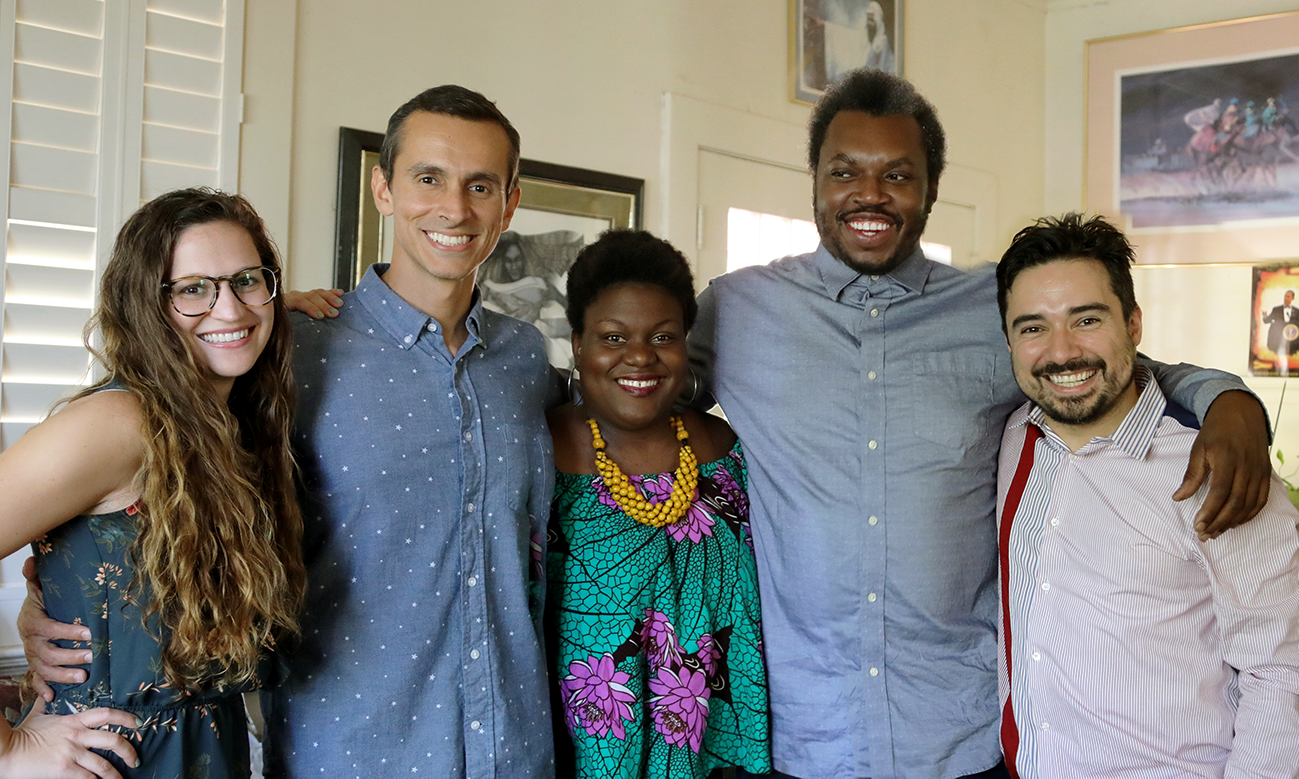 The Remember2019 Collective (Left to Right: Teague, Salgado, Brown, Sirah, Arboleda). Photo by Yazmany Arboleda.
The Remember2019 Collective (Left to Right: Teague, Salgado, Brown, Sirah, Arboleda). Photo by Yazmany Arboleda.This piece, “Not Another Memory Play” by Arielle Julia Brown, Ashley Teague, Carlos Sirah, Mauricio Salgado and Yazmany Arboleda was originally published on HowlRound Theatre Commons on July 16, 2020.
We are four years in and four years out.
We are one hundred years after and lifetimes away.
We are located in this moment in time, in the space of a breath, when the past becomes the present and points us on a trajectory toward the future.
Here we are, a congregation of our ancestors and our future generations.
Here, in South Phillips County, Arkansas. Here, in New York City. In Mississippi, in Los Angeles, in Philadelphia. Here, in the Delta.
We are here. We are.
We are four years in to a durational, grassroots engagement with the Black community of the Arkansas Delta called Remember2019. Fall of 2019 found us one hundred years after the largest mass lynching in American history stole the lives of more than 230 African Americans during the Red Summer of 1919. And we are looking forward into the next four years of this partnership. In the spirit of Remember2019’s mission, we seek to reflect on the past four years, the past hundred years, and to look ahead into a collective cultural imagining for the future, asking ourselves Dr. Martin Luther King Jr’s timely question: “Where do we go from here?”
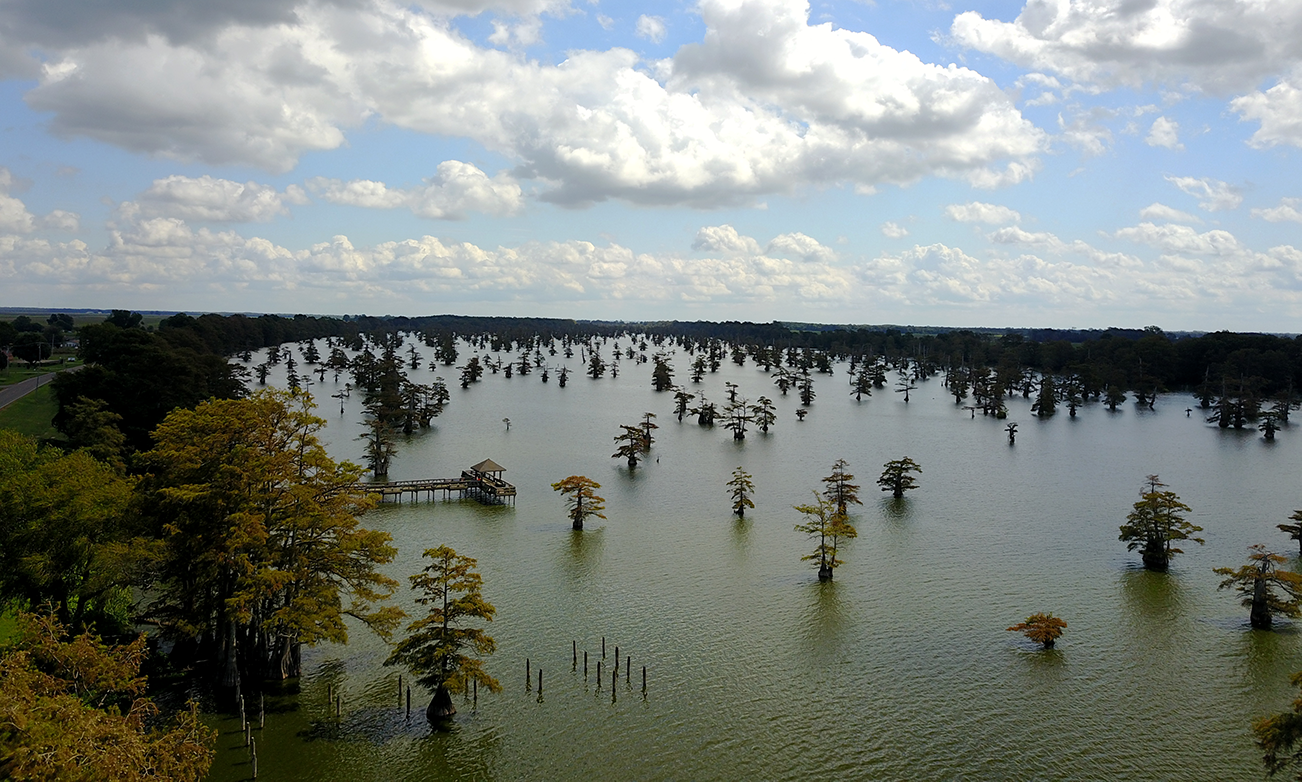
In 1919 in South Phillips County, Arkansas, white lynch mobs took the lives of more than two hundred African Americans in less than seventy-two hours in what is thought to be the largest mass lynching in United States history. The National Guard was called in to participate in what is now known as (but also contested as) the Elaine Massacre. In 2020, we are seeing history repeated—our government acting as a tool of racial terror. This history is critical to American identity. Instead of burying it, it must be acknowledged and dismantled. The Equal Justice Initiative calls for public acknowledgment and commemoration of mass violence; “formalizing a space for memory, reflection, and grieving” can help our communities recover from this traumatic history. In 2016, taking up that call, Mauricio Tafur Salgado reached out to several cultural workers including cultural strategist and artist Arielle Julia Brown (of Black Spatial Relics) and artist Yzamany Arboleda, and Remember2019 was formed.
Remember2019 makes spaces for the congregation of Black communities of Phillips County, Arkansas. Our work supports and facilitates local practices of self-determination, memory, and reflection that are directly related to the mass lynching of 1919, the lasting effects of racial terror, and the current and future health of these communities.
In 2017, cultural workers Ashley Teague (of Notch Theatre Company) and Carlos Sirah (a Mississippi Delta native and internationally produced writer and performer) joined the project. These five individuals are the non-local piece of the Remember2019 collective, which is also comprised of many Arkansas Delta stakeholders, including the Delta Cultural Center; the Elaine Legacy Center; the Boys, Girls, Adult, Community Development Center (BGACDC); Jarvis Smith, a parole officer for the West Helena Juvenile Courts; and a pastor interested in the work of empowering and uplifting young Black men in his community.
Our work supports and facilitates local practices of self-determination, memory, and reflection that are directly related to the mass lynching of 1919, the lasting effects of racial terror, and the current and future health of these communities.
Our entry points into the work are varied and intersecting, and we believe that interrogating and holding the specificity of our own cultural lenses and traditions is crucial to this kind of cultural transformation work.
With Remember2019, pledging to a long-term engagement upfront, we hoped to show our commitment to building trust within the community. Our first visit in the summer of 2016 was our open invitation to see if the community would even want to collaborate with us. Once that invitation was accepted, we decided upon eight years. Eight years would mark the centennial of the groundbreaking 1923 Moore vs Dempsey Supreme Court case—the final case in a series of egregious trials following the massacre that lead to the false conviction of 122 Black men, 12 of whom were sent to death row and eventually acquitted by the Federal Supreme Court. Eight years also created a balance of time spent visiting the community before and after the 1919 centennial.
To remember is to recall. We recall the mass lynching of 1919 and the intergenerational trauma that it caused for the Black communities of Phillips County.
To remember is to reunite. As members of distinct and different communities, we remember these communities in order to self-determine, see one another, and value our interconnectedness.
To remember is to remind. We center our work on the values and traditions that have brought us this far and are the wellspring of our enduring joy.
To remember is to call forth. We call forth community creativity, wisdom, and encourage a reimagining of our future, a hundred years after the mass lynching.
Over time, the program has become (intentionally or otherwise) a study in how durational, intimate, proximate, culturally specific artistic partnerships can have both deep grassroots and larger systemic impact on our society. Because of the mass lynching and the inequities that persist, the Delta is an apt space to take the pulse of race-based belonging in the United States at large. Facilitating artistic spaces of belonging for our most disenfranchised residents, while imagining spaces for healing and building power, can offer a model for similar interventions across the South and nationally.
Remember2019 holds at its center opportunities for a new story—a reframing of historical narratives and a fostering of a collective cultural imagination for the future. This dual practice of remembering and imagining, paired with an honest and reverent narrative of the Delta, has the capacity to instill in people the desire to remain in the region as adults, to apply innovative energy to underused and abandoned spaces, and to invest in the community’s future.
Facilitating artistic spaces of belonging for our most disenfranchised residents, while imagining spaces for healing and building power, can offer a model for similar interventions across the South and nationally.
Moreover, Remember2019’s work strives to be part of a values-based economic system that puts ownership in the hands of the communities that have been excluded by traditional for-profit and non-profit support. This long-term work strives to build new systems, networks, and funding streams to catalyze alternative economies so that our partners can achieve full financial freedom and autonomy.
Shifting economic power requires cultural transformation work. The program invests in and engages a body of local stakeholders who take ownership of the project, its products, and its funders. On this note, we raise a question to other cultural organizations doing this work: How is your work not just service delivery or program development but actually part of a larger movement? Furthermore, we are committed to practicing moral fundraising—raising funds from individuals and investors seeking economic justice and not the exploitation of people oppressed by poverty. And we ensure that at least 50 percent of funds go directly to community partners and participants.
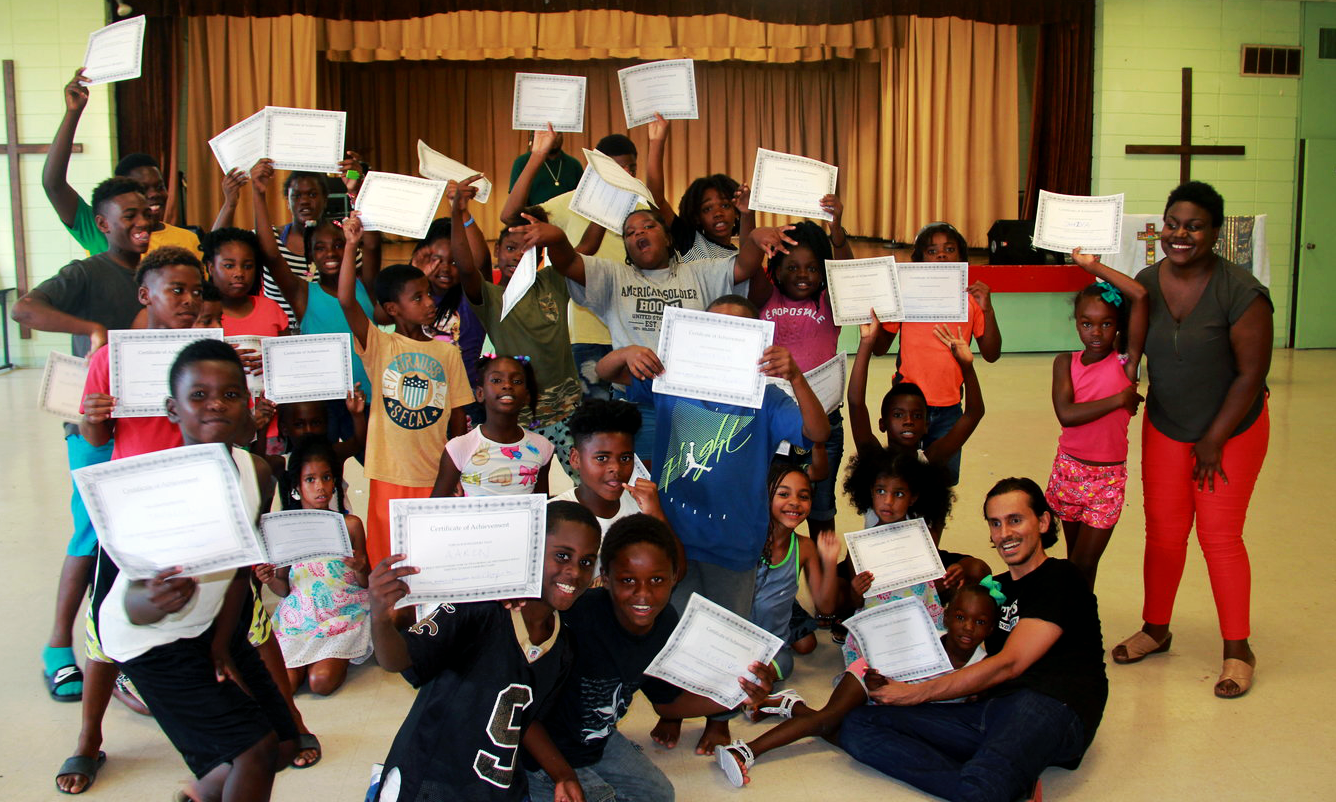
Our program began by connecting with organizational partners and local stakeholders already invested in this work on the ground. The Black community of the Arkansas Delta has technologies toward freedom that they have been practicing for a long time. Our work is to amplify, support, and invest in those strategies while offering the community resources toward those cultural acts of liberation. We believe the Black cultural and spiritual traditions of the Delta hold within them capacity for transformative storytelling, radical imagination, and healing. We also recognize there are many culturally specific forms of collecting history and that history is fundamental to culture and that cultures have been systematically weakened and destroyed when their forms of collecting history are delegitimized. We are committed to practicing culturally specific traditions of collecting and sharing history.
Our four-year community-engagement process grew into mutually reciprocal relationships resulting in several joint explorations, including a community mural designed by BGACDC youth, a summer theatre programs for seventy-plus young people across three towns, a staged reading of Christina Ham’s Scapegoat (a play about the mass violence of 1919), a Story-Sharing Institute and Juneteenth celebration, a touring blues concert, a pop-up story bank and archive of over a hundred stories from the Black community, a mixtape listening series, the callin’ down the road: RESIDENCY, and the latest initiative—Black Cypress: A Phillips County Survival Guide.
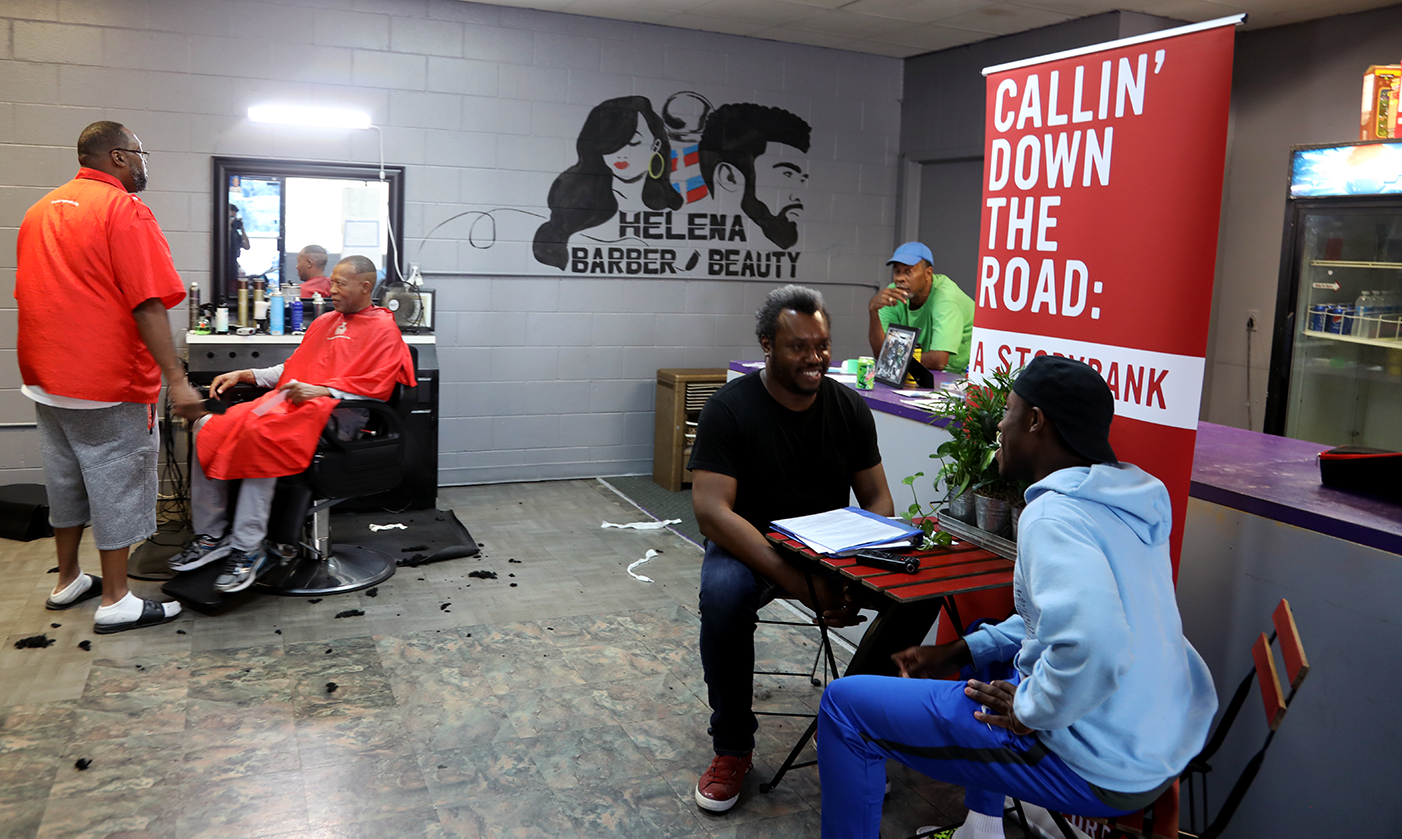
We memorialized the centennial of the 1919 lynching with the callin’ down the road: RESIDENCY, which supported six community members from across Phillips County—Faye Duncan Daniel, Phillip Stackhouse, Anita Marie Harrison Mayo, Lenora Marshall, Ethel Williams, and James White—in thinking about how story sharing is a part of their life and work. These individuals developed their own self-determined story-sharing practices, networked with other people working around the power of story, and received resources (including funding and training) to support a story-sharing project of their own making.
One project focused on the way colorism affects women in the African American community, while another focused on how music changes across several generations of related musicians. A third project looked at how different generations felt about remembering the massacre, and another brought youth and elders together to ask each other questions and share cross-generational stories.
In tandem with this work, we presented the callin’ down the road: STORYBANK, a series of pop-up story booths open to the public that took place at Black churches, barbershops, restaurants, senior centers, and schools. Stories shared at the booth were assembled into a hundred-minute mixtape, resulting in a quilt of Black experiences, songs, and soundscapes from all around the county. The mixtape was presented at callin’ down the road: MIXTAPE LISTENING PARTIES, which gathered the Black community to listen, remember, dance, share food and drink, dream, and celebrate Black freedom in Phillips County. The hundred stories collected are now available as a digital archive with accompanying transcripts, serving as both a living monument and a call for a more just future. Furthermore, we hope for them to one day be housed at a historically Black university or Black institution.
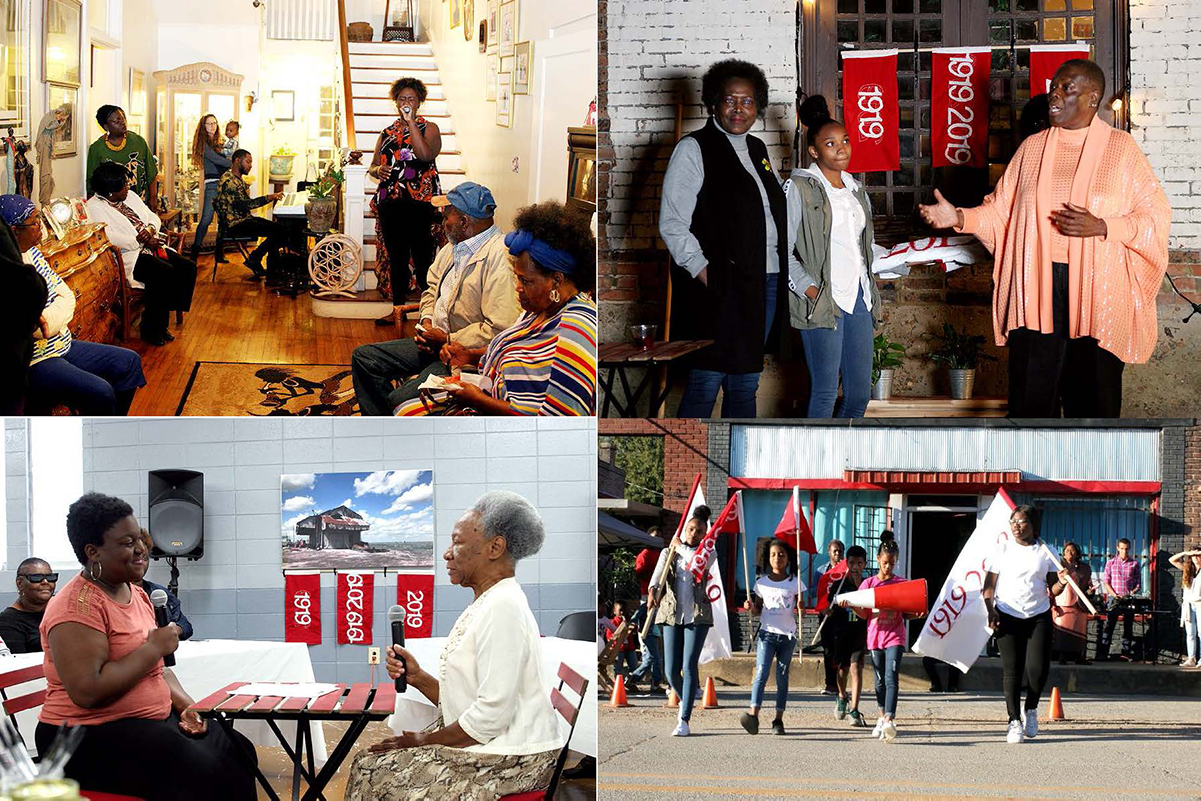
Additionally, our centennial programming included another tour of Black ‘n da Blues: Stories and Songs from the Arkansas Delta 1919–2019. Remember2019 and the Delta Cultural Center partnered to develop and present this series of concerts featuring local musicians (Vera White, James “Gone For Good” Morgan and Marcus “Mookie” Cartwright, all backed by the Second 2 None Band). Hosted by Angela Davis Johnson, who hails from the Arkansas Delta, the show weaves together field songs, spirituals, blues, and R&B music with contemporary and historical stories about the Black community’s experiences of the blues in the Delta.
We are currently producing Black Cypress: A Phillips County Survival Guide, commissioning members of the Arkansas Delta’s Black communities to collect stories, images, scriptures, songs, prayers, and recipes for hard times. Given the COVID-19 pandemic and the current uprisings taking place around the country and the world, this project is a chance for the community members of Phillips County to contribute their knowledge and expertise about how to survive this moment together. The letters will be published in a physical book available fall 2020 (to be sold by local partners). We hope it will help to provide a record of this time for Black people in the area—handwritten truths of our history, not the narrative passed on by the power brokers of white supremacy; something to share with family, community, and future generations.
The call from the Equal Justice Initiative, led by Bryan Stevenson, urged all of us to change the dominant cultural narrative by reframing what we remember about the racialized violence in this country’s past. The erasure or justification of that violence is what allows for the perpetuation and creation of racist policies. Our work has strived to subvert and expand our historic archives by centering culturally specific practices of remembrance and by affirming, collecting, and organizing stories that are not currently remembered. This is the work of our story bank, our Institute, our mixtape, Black ‘n da Blues, the Survival Guide, the residency. These programs are an affirmation of the stories that have been passed down within the Black community and are currently being shaped by members of the Black community of Phillips County. Our archives are a way of organizing and centering these stories, and the ways we’ve gone about collecting them and performing them subvert traditional notions of what makes for legitimate historic documentation.
The true value of Remember2019 doesn’t live in the non-profit industrial complex’s use of the word “impact,” nor in numbers and audience count and survey forms. It exists somewhere in a more spiritual realm. It lives in a belief in something larger than ourselves, in faith. We know that audiences are changed while watching a performance. But it is hard to say just how. How are they different? What happens to people in their seats as they participate in hearing and sharing their stories? How are people transformed by cultural experiences and exposure? This kind of change can feel intangible, maybe even spiritual, as we enter a liminal space through the theatre.
Early on in the program’s development we decided we were only going to engage with the Black community. Remember2019 isn’t about educating white folks or building bridges to that facet of the community, which often seems hell-bent on preventing progress for their Black neighbors (and thus for themselves). Remember2019 works with and for the Black community and their self-determined art around memory, reflection, and healing. The program strives to offer spaces for that healing—a spiritual healing that can only happen in affinity spaces.
Our archives are a way of organizing and centering these stories, and the ways we’ve gone about collecting them and performing them subvert traditional notions of what makes for legitimate historic documentation.
Much work is asked of artists to justify their existence. On a national level, our capitalist country does not share a belief in the intrinsic value of art. So we must constantly re-explain how our work contributes to and enriches our society. But how do you measure the soul? Is there a scale of achievement for healing? Have we ever officially “healed”?
Our work as artists and cultural workers must always reach beyond what we think is possible. This reach is a species of non-arrival. This reach is a mode of living. It is to remain and work firmly in the present, as we engage and seek to understand history, and, at the same time, reach for different futures. It is from this location, inside the work, where we find ourselves, where we find our values, and where we find orientation towards life (or existence).
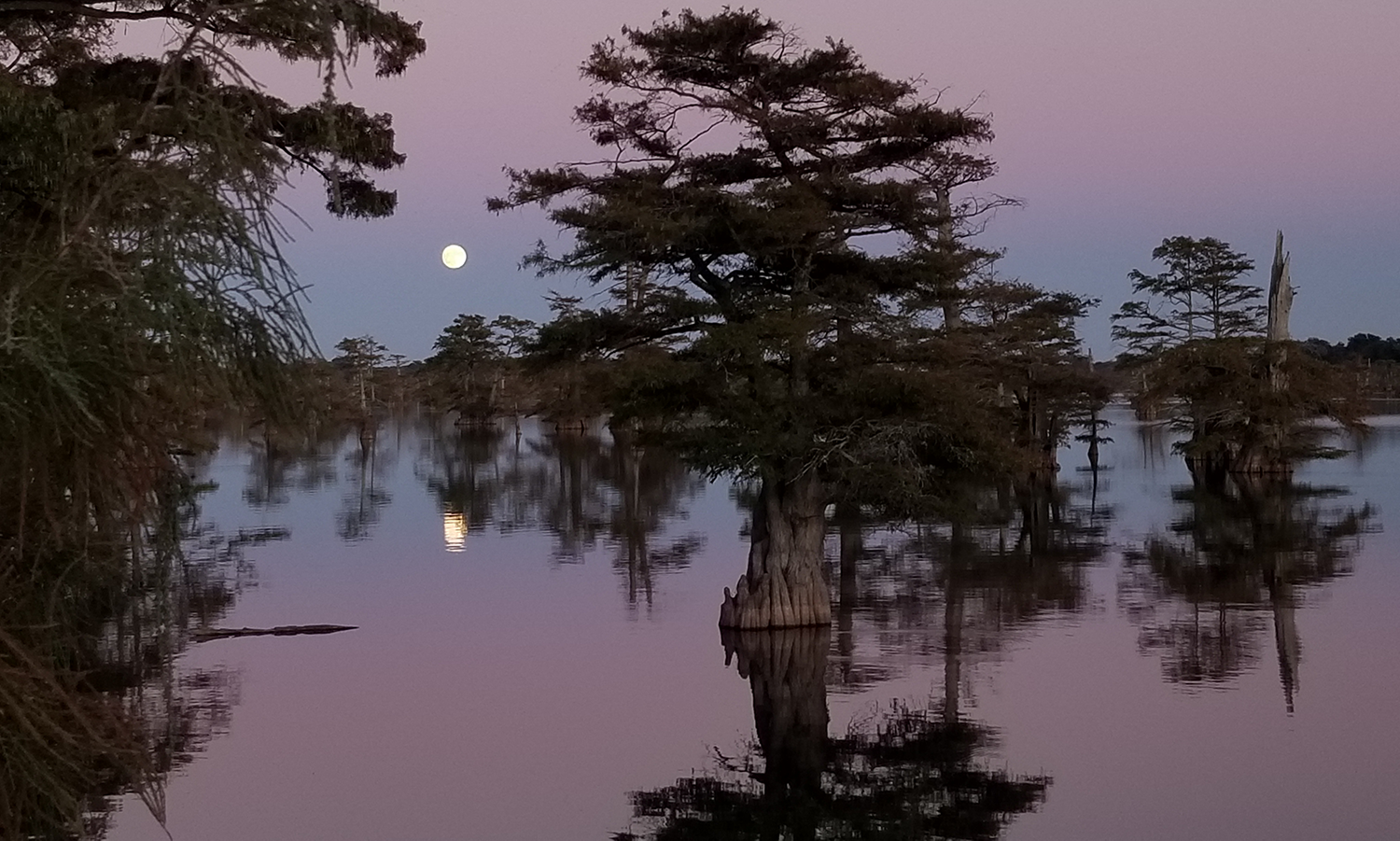
When we first arrived in Phillips County, many memorialization efforts were being lead by wealthy, white power-holders in the community. Once, when driving by a farm with a towering estate, one of our community partners said, “Those are still the masters of this community.”
When a physical Elaine Massacre monument was erected (not in Elaine but twenty-five miles away, in West Helena) by local brokers, few Elaine residents were in attendance for the opening ceremony. They instead hosted their own memorial event. Wendell Griffen, a noted social justice activist and local judge, denounced the monument in a statement to the Arkansas Times, and the community divide over the monument was explored in an article for the Wall Street Journal. In a piece titled “Want to Truly Memorialize a 100-year-old Race Massacre? Let the People see the Truth,” Judge Griffen mentions Remember2019’s contribution and writes that “the fervent struggle for justice continues in Elaine, often against formidable obstacles.”
One hundred years later.
Four years in.
And lifetimes away.
We are here.
Here in the Delta.
Here in New York City, in Philadelphia. Our history is with us everywhere we go, it is in the soil, it is in our bones.
We are here, in one country very divided.
We are here in the past, present, and future.
Together.
Elaine Arkansas resident Shelia Walker asked us: “How do we make good on a promise to all in a country that was founded on equality and oppression, on freedom and on slavery?” The legacies of belonging and disbelonging in the Delta are embedded in histories of enslavement and the under-compensated labor of the county’s Black residents. Art is able to raise awareness of, question, and challenge long-held beliefs of social and cultural supremacy, and it empowers people to become advocates for disruption of those systems.